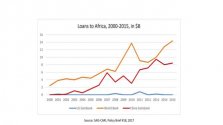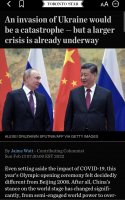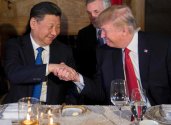The CFR report is replete with a compilation of:
“U.S. inaction as much as Chinese assertiveness is responsible for the economic and strategic predicament in which the United States finds itself. U.S. withdrawal helped create the vacuum that China filled with BRI…it [the U.S.] has not met the inherent needs of the region.” (emphasis added)
US Infrastructure Investment?

US stopped loaning money to Africa for infrastructure for several decades
It is well known that beginning in the 1970s, the U.S. moved away from investing in hard infrastructure. Hard infrastructure is essential to the growth of the physical economy. It is irreplaceable in providing a platform that is the foundation of a healthy economy. The U.S. abandoned the needs of the majority of the nations of the world and foolishly sabotaged the U.S. economy as well.
According to estimates by the World Bank sited in this report:
“…$97 trillion needs to be spent on infrastructure globally by 2040 in order to maintain economic growth and to meet the UN Sustainable Development Goals, but an $18 trillion gap exists.”
The report acknowledges that Western financial institutions and governments do not fund hard infrastructure.
Should BRI nations be punished for trying to improve the lives of their population by accepting China’s financing help? The African continent, which has the largest infrastructure deficit in the world, encounters a gap upwards of $100 billion a year for essential infrastructure investment.
The report itself admits the global benefits of the BRI:
“Since BRI’s launch in 2013, Chinese banks and companies have financed and built everything from power plants, railways, highways, and ports to telecommunications infrastructure, fiber-optic cables, and smart cities around the world…BRI has the potential to meet long-standing developing country needs and spur global economic growth.” (emphasis added)
Geopolitics Governs Western Thinking
If the CFR were genuinely concerned about addressing the huge lack of hard infrastructure that is keeping nations underdeveloped and forcing billions of people around the world to live in poverty, they would propose the U.S. collaborate with the BRI. However, they are more concerned in trying to maintain U.S. unipolar dominance.
For those of you who do not know, the Council on Foreign Relations is a 100 year old arm of the Anglo-American establishment. Founded in 1921 as the American branch of the British Royal Institute for International Affairs, otherwise known as Chatham House, which was createdtwo years earlier. Chatham House was created by Lord Alfred Milner, then acting as Secretary of State for the British Empire’s colonies, through a vast trust funded by the estate of race-patriot Cecil Rhodes.
- Contradictions
- Speculation that BRI nations debt to China “might” or “could” lead to economic distress
- China is not playing by the international rules imposed by Western international financial institutions
- Recommendations that do not address the reasons for the success of the BRI, but instead propose new forms of political-economic warfare to undermine China.
“U.S. inaction as much as Chinese assertiveness is responsible for the economic and strategic predicament in which the United States finds itself. U.S. withdrawal helped create the vacuum that China filled with BRI…it [the U.S.] has not met the inherent needs of the region.” (emphasis added)
US Infrastructure Investment?

US stopped loaning money to Africa for infrastructure for several decades
It is well known that beginning in the 1970s, the U.S. moved away from investing in hard infrastructure. Hard infrastructure is essential to the growth of the physical economy. It is irreplaceable in providing a platform that is the foundation of a healthy economy. The U.S. abandoned the needs of the majority of the nations of the world and foolishly sabotaged the U.S. economy as well.
According to estimates by the World Bank sited in this report:
“…$97 trillion needs to be spent on infrastructure globally by 2040 in order to maintain economic growth and to meet the UN Sustainable Development Goals, but an $18 trillion gap exists.”
The report acknowledges that Western financial institutions and governments do not fund hard infrastructure.
Should BRI nations be punished for trying to improve the lives of their population by accepting China’s financing help? The African continent, which has the largest infrastructure deficit in the world, encounters a gap upwards of $100 billion a year for essential infrastructure investment.
The report itself admits the global benefits of the BRI:
“Since BRI’s launch in 2013, Chinese banks and companies have financed and built everything from power plants, railways, highways, and ports to telecommunications infrastructure, fiber-optic cables, and smart cities around the world…BRI has the potential to meet long-standing developing country needs and spur global economic growth.” (emphasis added)
Geopolitics Governs Western Thinking
If the CFR were genuinely concerned about addressing the huge lack of hard infrastructure that is keeping nations underdeveloped and forcing billions of people around the world to live in poverty, they would propose the U.S. collaborate with the BRI. However, they are more concerned in trying to maintain U.S. unipolar dominance.
For those of you who do not know, the Council on Foreign Relations is a 100 year old arm of the Anglo-American establishment. Founded in 1921 as the American branch of the British Royal Institute for International Affairs, otherwise known as Chatham House, which was createdtwo years earlier. Chatham House was created by Lord Alfred Milner, then acting as Secretary of State for the British Empire’s colonies, through a vast trust funded by the estate of race-patriot Cecil Rhodes.



